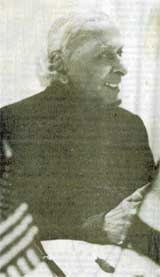
It was only a few weeks ago that I learned about the passing, on July 8, 2006, of
Raja Rao (b. 1908, Mysore, India--at left,
India Tribune). He was one of least well-known of the major 20th century Indian novelists. Rao's philosophically imbued, at times formally innovative fiction, which offered a new approach for incorporating Vedantism and other non-Western ideas, into the European novelistic form, helped to foster the blossoming of the English-language novel in India. His most highly acclaimed works are the anti-imperialist novel
Kanthapura (1938, 1963) and the spiritually profound, rather abstract
The Serpent and the Rope (1960), for which he was eventually awarded the
Neustadt International Prize in 1988. Rao also wrote several important non-fiction texts, on India and other topics, and taught philosophy for over 20 years at the
University of Texas.
One of the best tributes on his behalf is the sole poem that the great poet
Czeslaw Milosz wrote in English, "
To Raja Rao," from 1969, which I reprint below (I've borrowed it from
Poet Seers):
TO RAJA RAO
Raja, I wish I knew
the cause of that malady.
For years I could not accept
the place I was in.
I felt I should be somewhere else.
A city, trees, human voices
lacked the quality of presence.
I would live by the hope of moving on.
Somewhere else there was a city of real presence,
of real trees and voices and friendship and love.
Link, if you wish, my peculiar case
(on the border of schizophrenia)
to the messianic hope
of my civilization.
Ill at ease in the tyranny, ill at ease in the republic,
in the one I longed for freedom, in the other for the end of corruption.
Building in my mind a permanent polis
forever deprived of aimless bustle.
I learned at last to say: this is my home,
here, before the glowing coal of ocean sunsets,
on the shore which faces the shores of your Asia,
in a great republic, moderately corrupt.
Raja, this did not cure me
of my guilt and shame.
A shame of failing to be
what I should have been.
The image of myself
grows gigantic on the wall
and against it
my miserable shadow.
That's how I came to believe
in Original Sin
which is nothing but the first
victory of the ego.
Tormented by my ego, deluded by it
I give you, as you see, a ready argument.
I hear you saying that liberation is possible
and that Socratic wisdom
is identical with your guru's.
No, Raja, I must start from what I am.
I am those monsters which visit my dreams
and reveal to me my hidden essence.
If I am sick, there is no proof whatsoever
that man is a healthy creature.
Greece had to lose, her pure consciousness
had to make our agony only more acute.
We needed God loving us in our weakness
and not in the glory of beatitude.
No help, Raja, my part is agony,
struggle, abjection, self-love, and self-hate,
prayer for the Kingdom
and reading Pascal.
Copyright © Czeslaw Milosz, 1969.
 It was only a few weeks ago that I learned about the passing, on July 8, 2006, of Raja Rao (b. 1908, Mysore, India--at left, India Tribune). He was one of least well-known of the major 20th century Indian novelists. Rao's philosophically imbued, at times formally innovative fiction, which offered a new approach for incorporating Vedantism and other non-Western ideas, into the European novelistic form, helped to foster the blossoming of the English-language novel in India. His most highly acclaimed works are the anti-imperialist novel Kanthapura (1938, 1963) and the spiritually profound, rather abstract The Serpent and the Rope (1960), for which he was eventually awarded the Neustadt International Prize in 1988. Rao also wrote several important non-fiction texts, on India and other topics, and taught philosophy for over 20 years at the University of Texas. One of the best tributes on his behalf is the sole poem that the great poet Czeslaw Milosz wrote in English, "To Raja Rao," from 1969, which I reprint below (I've borrowed it from Poet Seers):
It was only a few weeks ago that I learned about the passing, on July 8, 2006, of Raja Rao (b. 1908, Mysore, India--at left, India Tribune). He was one of least well-known of the major 20th century Indian novelists. Rao's philosophically imbued, at times formally innovative fiction, which offered a new approach for incorporating Vedantism and other non-Western ideas, into the European novelistic form, helped to foster the blossoming of the English-language novel in India. His most highly acclaimed works are the anti-imperialist novel Kanthapura (1938, 1963) and the spiritually profound, rather abstract The Serpent and the Rope (1960), for which he was eventually awarded the Neustadt International Prize in 1988. Rao also wrote several important non-fiction texts, on India and other topics, and taught philosophy for over 20 years at the University of Texas. One of the best tributes on his behalf is the sole poem that the great poet Czeslaw Milosz wrote in English, "To Raja Rao," from 1969, which I reprint below (I've borrowed it from Poet Seers):
No comments:
Post a Comment